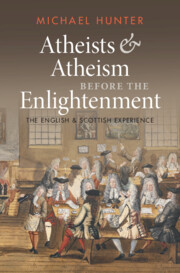Book contents
- Atheists and Atheism before the Enlightenment
- Atheists and Atheism before the Enlightenment
- Copyright page
- Contents
- Acknowledgements
- Chapter 1 Introduction
- Chapter 2 The Problem of ‘Atheism’ in Early Modern England
- Chapter 3 Atheism among the Godly
- Chapter 4 ‘This degenerate Age … so miserably over-run with Scepticism and Infidelity’
- Chapter 5 ‘Aikenhead the Atheist’
- Chapter 6 An Atheist Text by Archibald Pitcairne
- Chapter 7 The Text of Pitcairneana
- Chapter 8 The Trial of Tinkler Ducket
- Chapter 9 Conclusion
- Bibliography
- Index
Chapter 1 - Introduction
The Nature of Atheism and the Assurance of Atheists
Published online by Cambridge University Press: 06 July 2023
- Atheists and Atheism before the Enlightenment
- Atheists and Atheism before the Enlightenment
- Copyright page
- Contents
- Acknowledgements
- Chapter 1 Introduction
- Chapter 2 The Problem of ‘Atheism’ in Early Modern England
- Chapter 3 Atheism among the Godly
- Chapter 4 ‘This degenerate Age … so miserably over-run with Scepticism and Infidelity’
- Chapter 5 ‘Aikenhead the Atheist’
- Chapter 6 An Atheist Text by Archibald Pitcairne
- Chapter 7 The Text of Pitcairneana
- Chapter 8 The Trial of Tinkler Ducket
- Chapter 9 Conclusion
- Bibliography
- Index
Summary
Chapter 1 considers the fear of atheism that gripped early modern thinkers, assessing its nature and extent and seeking to explain its rationale; in the course of this, its association with trends in the thought of the period such as naturalism, secularism and Deism is considered, as is its supposed link with immoralism. The chapter also asserts that the few well-documented examples of actual atheists that are known from the period were characterised by the ‘assurance’ that they showed in propagating their views, in contrast to the doubts suffered by Christian believers, a point that is illustrated by recourse to the history of emotions. The remainder of the chapter summarises the content of the rest of the book, paying particular attention to the Cerne Abbas enquiry of 1594 and to the apostacy of Christopher Marlowe and of John Eliot in Edinburgh in 1694.
Keywords
- Type
- Chapter
- Information
- Atheists and Atheism before the EnlightenmentThe English and Scottish Experience, pp. 1 - 32Publisher: Cambridge University PressPrint publication year: 2023

